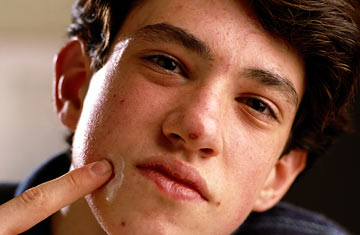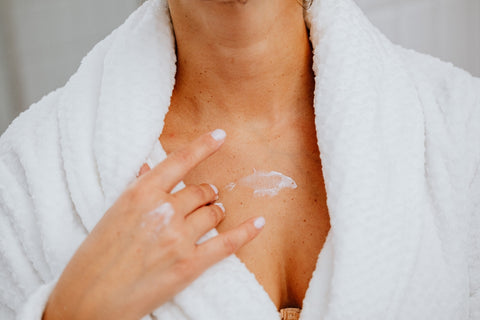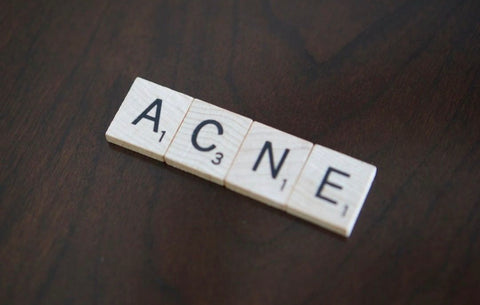Teen Boys: Winning the Battle Against Acne

Puberty is an awkward and often uncomfortable phase in our lives. It’s riddled with heartbreaks and, unfortunately for many, acne. Around 85% of teenagers have acne, with boys experiencing it a couple of years later than girls. Needless to say, acne for teens is a big self-esteem killer. However, it’s not the end of the world. There’s a lot you can do to win the battle against acne.
Boys are often at a disadvantage, primarily because of the existing stigma around male skincare and cosmetics. Yes – teenage boys are vulnerable to gender norms too. From a very young age, guys are primed by society to look more masculine and tough. If boys put more effort into their appearance, they will get mocked by their peers, as if a cleanser and moisturizer can ever threaten their manhood.
If you’re a guy, and you want clean, clear skin, there’s nothing to be ashamed about. Proper skincare habits can improve your health and beauty. Moreover, it can affect how you feel about yourself.
So let’s delve into the discussion, starting with the importance of good skincare habits. Here, you will find out why guys should take care of their skin. You will also learn the best
acne treatment for boys. To help you start healthy skincare habits, we will show you how to build a solid foundation for a skincare regimen.
Guys, Skincare Is for You Too
Teenage boys can talk about fitness, shaving, or haircare but neglect one crucial part of their health—their skin. As the largest organ in the body, the skin is responsible for many functions. Taking care of it not only makes you look good, but it also enables you to stay healthy. After all, it serves as a protective barrier against germs and bacteria. Moreover, it protects you from the harsh rays of the sun.
The majority of skincare products are marketed to females. As it’s mostly lumped into the beauty section, guys don’t usually bother to talk about skincare. Boys often shy away from discussing skin problems and avoid much-needed products, even when their acne is already bothering them.
The truth of the matter is: skincare isn’t a concern that’s only for women. Poor skincare habits can make treatable acne more severe, whether you’re a girl or a boy. It can cause rashes, wrinkles, and other issues that affect how we perceive ourselves and feel about our appearance.
Research has shown that acne lowers teenagers’ self-esteem and confidence. Some will even go to the extent of skipping social gatherings or school when breakouts occur. This makes skincare all the more important. If your skin problems are making it difficult for you to go about your daily activities, you should develop a personal routine to address existing conditions and prevent further issues.
What Causes Acne in Teenage Dudes?
Acne is caused by all kinds of factors, so you know what causes it and how you can prevent it, you should understand what goes on under your skin.
Once you hit puberty, your body begins to produce excessive amounts of androgens, which are your sex hormones. Your oil glands swell and increase the production of sebum as a result. As oil builds up, your pores will clog up. If they become infected or inflamed, pimples will start to form on your skin.
Genetics has a lot to do with acne. If your parents had acne growing up, there is a good chance that you will experience it too. However, don’t lose hope. You can minimize your acne, protect your skin from scarring, and maintain clear skin with proper care.
Clothing can worsen existing acne, especially when you have it on your back and chest. The weather is also a contributing factor. Whether you live in a hot, humid climate or you simply like activities that make you sweat a lot, you need to take better care of your skin to reduce flare-ups.
Another likely culprit of your acne is stress. It causes excessive production of sebum. Hence, don’t be surprised when you have zits before an exam or a date.
There are different types of acne lesions, all of which are most noticeable around the parts of your body with a lot of oil glands. Aside from your face, this includes your neck, back, shoulder, and upper arms. Treatment depends on the severity of your problem. Whiteheads and blackheads are the least severe types of lesions you can have. They are the easiest to treat as well. For occasional flare-ups, you can use skin compounds with glycolic acid, azelaic acid, salicylic acid, or retinoids.
Cystic acne is one of the more severe forms. In such cases, acne medication for teens might be necessary. Getting rid of it isn’t easy, but it isn’t impossible as well. With proper and consistent habits, you can free your skin of bacterial infections, reduce inflammation, and alleviate redness. Doctors might prescribe oral antibiotics for short-term use. They can minimize pustules and cysts on the face and other parts of the body.
It’s always best to consult with a medical professional for severe cases.
How to Zap Those Zits Away
One of the best ways to keep your skin clear is by committing to a sound skincare routine. Before you start adding products to your cart, you should find out your skin type. Knowing your skin can help you address your issues more effectively. Using a blotting paper, gently dab it across your face. Hold it up to the light to find out how much oil is visible.
If the sheet is full of oil, you most likely have oily skin. You have dry skin if the sheet shows little to no oil. Meanwhile, a visible shine on your t-zone but a lack of sheen on your cheeks means that your skin is a combination of dry and oily.
On top of that, it’s important to remember that boys have thicker and firmer skin compared to girls. If you are looking for acne medication for teens, you should select those that are formulated for boys’ skin.
Although everyone’s skin problems and needs are different, there are basic rules that you need to follow when you’re creating your personal routine. Here are a few steps that can help you build healthy skincare habits.
Step 1: Wash away all the dirt and impurities from your face
Wash your face twice daily. You need a good skin cleanser that can remove dirt, dead skin cells, and other impurities from your face, ideally one that fits your skin’s needs. Those who have sensitive skin should use gentle cleansers that don’t strip the face of its natural oils.
For a deeper cleanse, exfoliate once or twice a week. It removes old skin cells and promotes the growth of new cells. Oilier skin types, which are prone to have clogged and congested pores, can do this more frequently using gentle physical exfoliations without abrasive microparticles from nuts or seeds. It should support faster cell turnover and lighten dark spots.
Finding the right products for sensitive skin can be tricky because it takes time and effort to find ingredients that won’t inflame or irritate the face. In your search, it’s always best to try one product at a time. You may also test new formulas on your inner forearm before putting it on your face to prevent undesirable reactions.
Step 2: Keep your skin moisturized and hydrated
Following a deep cleanse or exfoliation, you should use a moisturizing cream and a toner to keep your skin hydrated. It helps you retain that soft, supple complexion.
Facial lotions are often oil-based. They are suitable for guys with normal skin types, especially those with dry, flaky skin. However, they aren’t ideal for oily, acne-prone skin. If you break out easily, you should choose a water-based moisturizer.
Using high-quality serums can also maintain your skin’s moisture. Products made with hyaluronic acid, for instance, can improve moisture levels and strengthen the skin barrier. That means you can prevent dirt and other impurities from clogging up your pores. You can eliminate acne-causing bacteria that make you breakout.
Serums can penetrate deeper into the skin, giving your face a smoother, healthier complexion. On top of that, they can reduce the appearance of your pores with regular use.
Another important tip to improve your skin’s hydration is to drink a lot of water. Consume 8 to 10 glasses of water daily to prevent dehydration. You should also be mindful of your caffeine and alcohol intake as such beverages can make your skin dehydrated.
Step 3: Protect your skin from sun damage
Sunscreen should be a part of your morning routine, even if you’re staying indoors all day. Sun damage is the leading cause of premature skin aging and cancer. Thus, make sure to use oil-free sunscreen or an SPF moisturizer to keep your skin protected from the harsh rays of the sun. Make sure it has an SPF rating of 30 and a PA rating of +++.
The sun’s rays are strongest around 10am to 2pm. It’s best to stay indoors within these hours. If you need to go out, you can wear a hat or long sleeves for extra protection.
Step 4: Control your blemishes
Use blemish control treatments to fix issues before they become more severe. You can use over-the-counter acne treatment medications such as benzoyl peroxide or salicylic acid creams to control mild forms of acne. It can clear up your flare-ups and prevent blemishes from forming. Don’t expect the treatment to work overnight. It should take nearly a month for the medication to produce noticeable results.
Take note that these over-the-counter medications can make your skin dry. If it makes your skin irritated, wash the product off. You can try to apply it again the next day. However, if irritation persists, you need to stop using it.
Some may be allergic to these acne treatments. In such cases, you should discontinue usage immediately to avoid life-threatening symptoms like difficulty in breathing or lightheadedness. Remember that it’s always best to seek help from a medical professional. Dermatologists can inspect your skin and prescribe the right acne treatments for your skincare regimen.
Takeaway
Acne isn’t solely a female concern, so why should skincare be limited to girls?
Skincare is crucial to everyone’s health. It makes your skin look good and healthy, preventing diseases and infections. More importantly, for any teenager, clean and clear skin can improve your self-esteem and confidence.
Using a cleanser or moisturizer won’t make you any less of a man. Once you get past the gender stereotypes and accept that you too can benefit from a good skincare routine, you can win the battle against acne.
Hopefully, our advice can urge you to take better care of your skin and restore your confidence.


